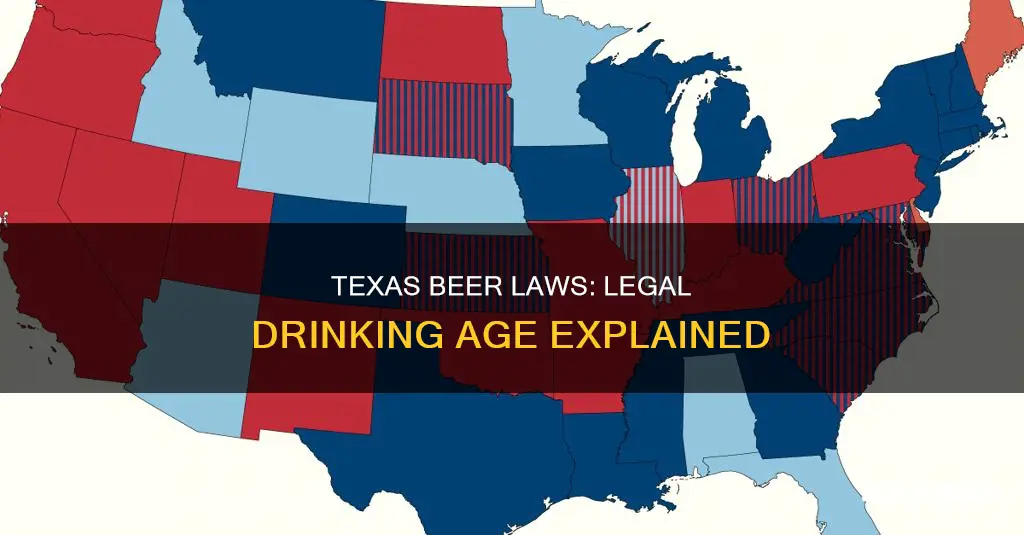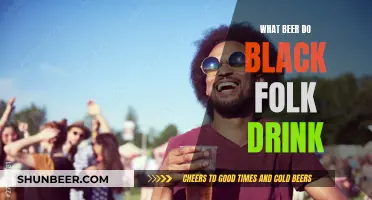
Texas has a reputation for its love of beer, but what about for those who are underage? In Texas, the minimum drinking age is 21 years old, and there are serious consequences for those who drink underage or provide alcohol to minors. However, there are some exceptions to the law, and it's not uncommon for minors to drink with their parents' consent. So, what exactly are the rules and regulations surrounding underage drinking in the Lone Star State?
| Characteristics | Values |
|---|---|
| Legal drinking age in Texas | 21 years |
| Age when drinking is allowed with parental supervision | 15-17 years |
| Age to work in a company serving alcohol | 18 years |
What You'll Learn

Drinking in public under 18
Texas has strict laws regarding underage drinking, and the consequences for drinking in public under the age of 18 can be severe. The legal drinking age in Texas is 21 years old, and anyone under this age is considered a minor when it comes to alcohol-related offences.
Minors who are caught drinking in public can face a range of penalties, including fines, community service, and the suspension of their driver's license. The specific consequences depend on the age of the minor and the number of previous offences. For example, a minor who is caught drinking in public for the first time may be required to pay a fine of up to $500, attend an alcohol awareness class, perform community service for 8 to 40 hours, and have their driver's license suspended for 30 to 180 days. If the minor is 17 or older and this is their third offence, the penalties can include a fine of $250 to $2,000, jail time of up to 180 days, or both, as well as an automatic driver's license suspension.
It is important to note that Texas has a zero-tolerance policy for minors drinking and driving. This means that any minor who is caught driving with any detectable amount of alcohol in their system can be charged with a Driving Under the Influence (DUI) offence, which carries its own set of serious penalties.
In addition to the legal consequences, underage drinking can also have other negative impacts on an individual's life. For example, a Minor in Possession (MIP) or Minor in Consumption (MIC) charge can stay on a person's record and affect their future opportunities. Furthermore, underage drinking can lead to health problems and increase the risk of accidents and injuries.
While there are some exceptions to the law, such as minors consuming alcohol under the supervision of a parent or guardian, it is essential for individuals under the age of 18 to understand the risks and consequences associated with drinking in public in Texas. The state takes underage drinking very seriously, and the penalties reflect this.
Beer Drinking in IMAX Moore: What's Allowed?
You may want to see also

Drinking at home under supervision
Texas is one of ten states that allow for the consumption of alcohol by minors in the presence of supervising family members. In Texas, parents are responsible for the safety of minors under 15 when the minor is on their property or property leased by them and under their care, custody, and control.
An adult may provide alcohol to a minor if they are the minor's adult parent, guardian, or spouse, and are visibly present when the minor possesses or consumes the alcoholic beverage. It is against the law to make alcohol available to a non-family person younger than 17, even on one's own property and even with permission from a parent of that person.
Texas holds parents and adults civilly liable for damages caused by the intoxication of a minor younger than 17 if they knowingly provided alcohol or allowed alcohol to be served on property owned or leased by them. If a minor sustains injuries or dies as a result of drinking on the property, gets into a fight, falls and hurts themselves, damages property, or leaves the property and is involved in a motor vehicle accident, the adult who provided the alcohol may be held responsible.
The minimum drinking age in Texas is 21 years old. However, minors who are at least 15 or 17 years old may publicly drink an alcoholic beverage in certain exceptions. For example, a minor may consume alcohol if they are in the visible presence of their adult parent, guardian, or spouse. This exception does not apply to other minors for whom the adult is not a guardian.
Texas takes underage drinking extremely seriously. Minors who are caught drinking alcohol without legal guidance can face serious legal consequences, including fines, community service, alcohol awareness classes, and temporary suspensions of their driver's licenses.
Beer on the Road: California Drinking Laws
You may want to see also

Drinking with parents in restaurants
Texas laws regarding underage drinking are strict, with severe consequences for those who break them. The legal drinking age in Texas is 21, and drinking establishments in Austin also require patrons to be 21 or over. However, there are some exceptions to this rule.
Texas is one of ten states that allow consumption by minors in the presence of consenting and supervising family members. This means that a minor can drink beer with their parents in a restaurant, as long as the parents are visibly present and supervising. This is also permitted by Texas Penal Code § 106.05, which states that a minor can be in possession of alcohol when in the visible presence of their parents, and Texas Penal Code § 106.04, which allows for consumption in these circumstances.
However, this does not mean that a restaurant will serve alcoholic drinks to minors, even when they are with their parents. It is up to the restaurant's discretion whether to serve alcohol to minors, and many establishments will not take the risk of allowing minors on their premises.
It is important to note that these exceptions only apply when the minor is with their own parents or legal guardians, and only when the adult is supervising the consumption of alcohol. If a minor is caught drinking alcohol without this supervision, they can face serious legal consequences, including fines, community service, and the suspension of their driver's license.
Texas also has a zero-tolerance policy for minors drinking and driving. Any minor operating a motor vehicle or watercraft in a public place with any detectable amount of alcohol in their system can be charged with a DUI, which carries its own set of severe penalties.
Vaccine and Beer: What's Safe to Drink?
You may want to see also

Minors drinking and driving
Texas has a number of laws and penalties in place to address the issue of underage drinking and driving. The legal drinking age in the state is 21, and any individual under the age of 21 who operates a motor vehicle or watercraft in a public place with any detectable amount of alcohol in their system is breaking the law. This is known as the Texas Zero Tolerance Law.
The consequences for a minor's first offence of drinking and driving include:
- A Class C misdemeanour, punishable by a fine of up to $500.
- Attendance of an alcohol awareness class.
- 20 to 40 hours of mandatory community service.
- 60-day driver's license suspension and no eligibility for an occupational license for the first 30 days.
For a second offence, the penalties increase to:
- A Class C misdemeanour, punishable by a fine of up to $500.
- Attendance of an alcohol awareness class at the judge's discretion.
- 40 to 60 hours of mandatory community service.
- 120-day driver's license suspension and no eligibility for an occupational license for the first 90 days.
A third offence is treated even more severely. The minor is not eligible for deferred adjudication, and their driver's license is suspended for 180 days. They may not obtain an occupational license for the entire suspension period. If the minor is 17 or older, the fine increases to $500 to $2,000, confinement in jail for up to 180 days, or both.
Under Texas law, it is also illegal for adults to provide alcohol to minors. Making alcoholic beverages available to a minor is a class A misdemeanour, punishable by a fine of up to $4,000, confinement in jail for up to a year, or both. The adult's driver's license would also be automatically suspended for 180 days upon conviction.
Anybody over the age of 21, except for the parent or guardian, can be held liable for damages caused by the intoxication of a minor under 18 if they knowingly provided alcoholic beverages to the minor or allowed them to be served on premises they own or lease.
The state of Texas takes underage drinking and driving extremely seriously due to the high number of DUI-related motor vehicle collisions and fatalities caused by drivers under the age of 21. The legal drinking age has been gradually raised over the years, from 18 in 1971, to 19 in 1979, and finally to 21 in 1984, as legislators sought to curb drunk-driving instances.
Beer and Women: A Perfect Pairing?
You may want to see also

Adults serving alcohol to minors
In Texas, it is illegal to provide alcohol to a minor. The state defines a minor as anyone under the age of 21. There are some exceptions to this rule, as Texas is one of ten states that allow for the consumption of alcohol by minors in the presence of consenting and supervising family members. In this case, a minor may consume an alcoholic beverage if they are in the visible presence of their adult parent, guardian, or spouse. The adult parent, guardian, or spouse must purchase the alcoholic beverage and be visibly present when the minor consumes it. It is against the law to make alcohol available to a non-family person younger than 17, even on one's own property and even with permission from the minor's parent.
Texas holds parents and adults civilly liable for damages caused by the intoxication of a minor younger than 17 if they knowingly provided alcohol or allowed alcohol to be served on property owned or leased by them. This includes cases where the minor is injured or dies as a result of drinking on the property, gets into a fight, falls and hurts themselves, is sexually assaulted, damages someone else's property, or leaves the property and is involved in a motor vehicle accident causing injury to themselves or others.
The consequences for providing alcohol to a minor in Texas are severe. Making alcoholic beverages available to a minor is a class A misdemeanor, punishable by a fine of up to $4,000, confinement in jail for up to a year, or both. Additionally, the offender's driver's license would be automatically suspended for 180 days upon conviction. Anybody 21 or older (other than the parent or guardian) can be held liable for damages caused by the intoxication of a minor under 18 if the adult knowingly provided alcoholic beverages or allowed them to be served on premises owned or leased by the adult. Sale of alcohol to a minor is also a class A misdemeanor, punishable by a fine of up to $4,000, confinement in jail for up to a year, or both.
It is important to note that Texas has strict laws regarding underage drinking and providing alcohol to minors. These laws are in place to ensure the safety and well-being of minors and to prevent alcohol-related incidents and accidents. It is the responsibility of adults to adhere to these laws and make safe and smart choices when it comes to alcohol consumption and minors.
Hot Car Beer: Is It Safe to Drink?
You may want to see also
Frequently asked questions
The legal drinking age in Texas is 21.
Yes, Texas is one of ten states that allow consumption by minors in the presence of consenting and supervising family members. Minors may consume alcohol if they are in the visible presence of their adult parent, guardian, or spouse.
If you are caught drinking, attempting to buy, buying, or possessing alcohol under the age of 21, you may face a Class C misdemeanour, a fine of up to $500, attendance of an alcohol awareness class, 8 to 40 hours of community service, and a 30- to 180-day loss or denial of your driver's license.
If you are 17 or older and it is your third offence, you may be fined $250 to $2,000, face jail confinement of up to 180 days, or both. You will also face an automatic driver's license suspension.







